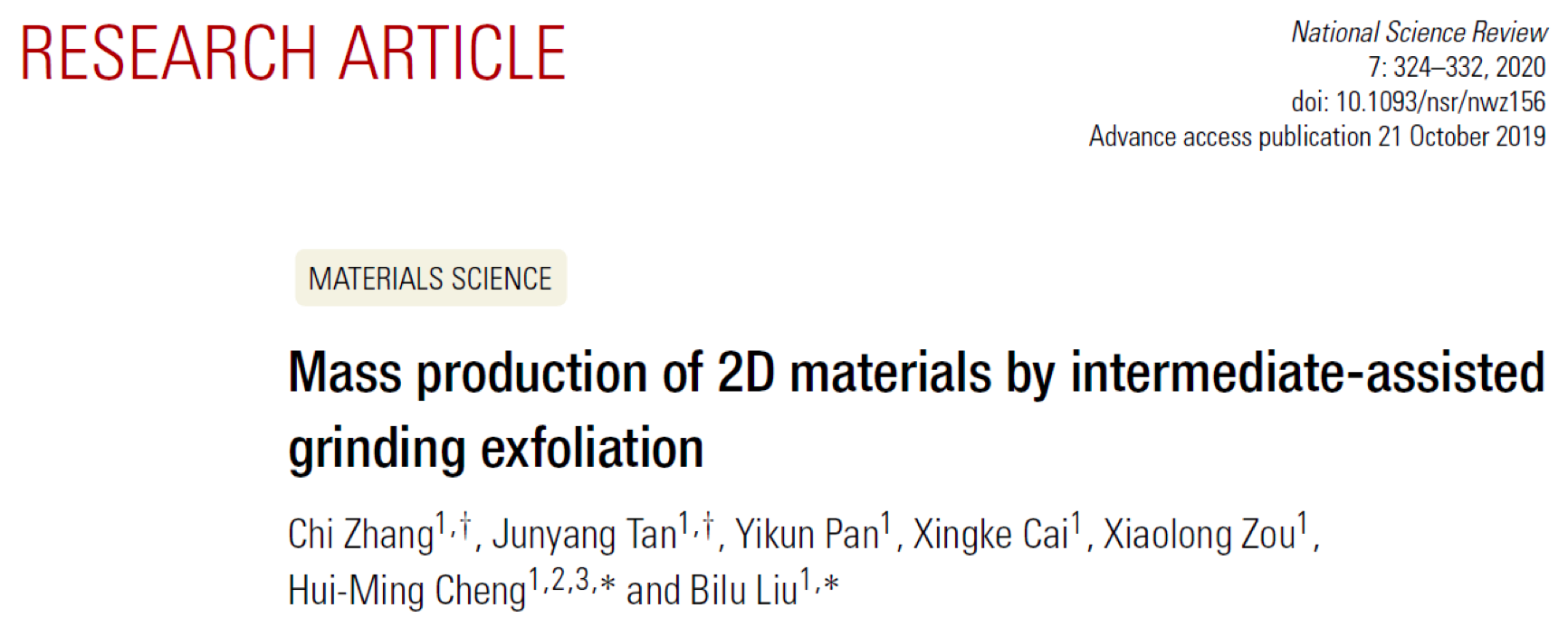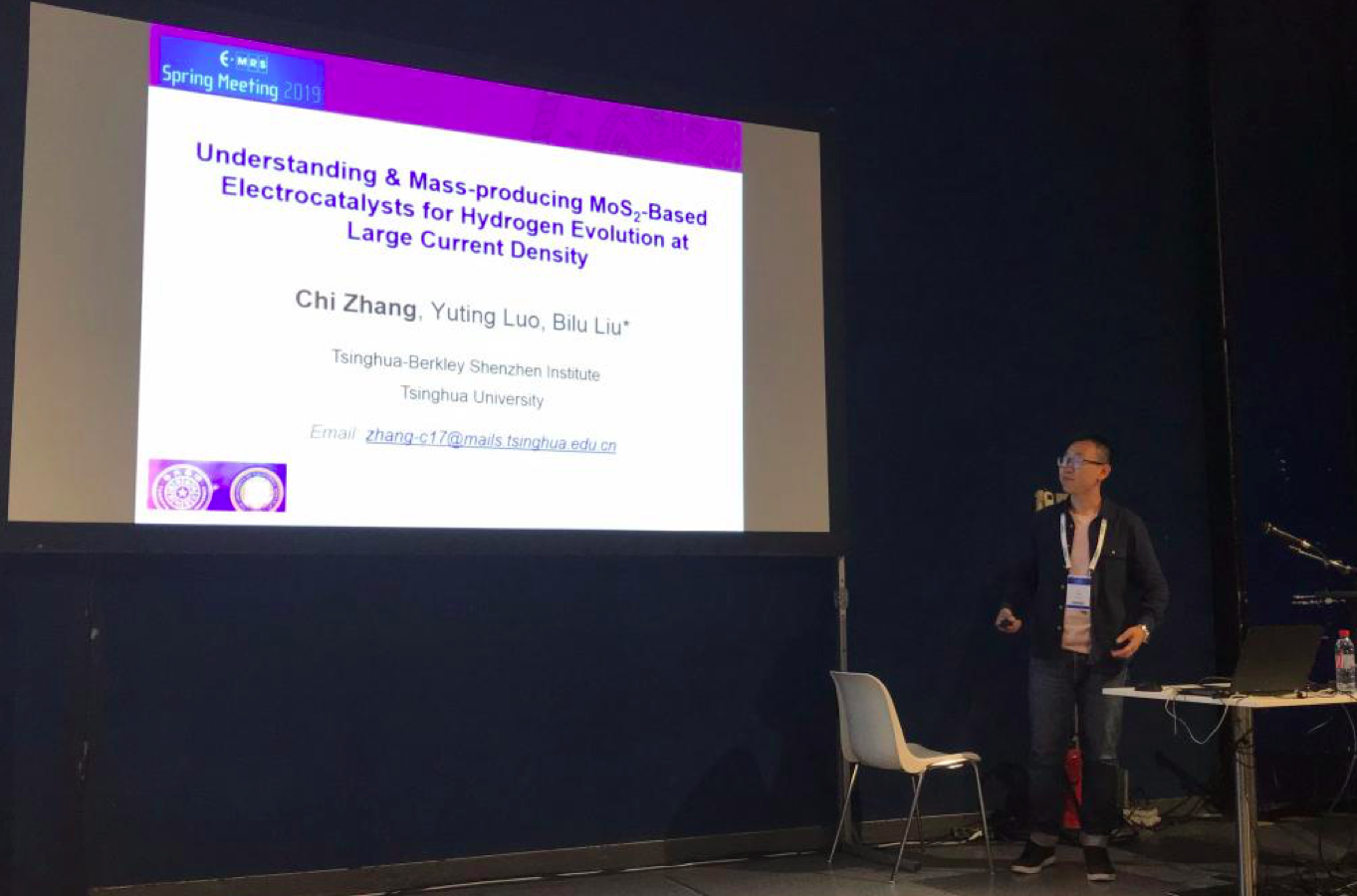Zhang Chi ‘20 is a master's graduate from Tsinghua-Berkeley Shenzhen Institute (TBSI), majoring in Material Science and Engineering. Supervised by Associate Prof. Liu Bilu, he studied the mass production of 2D materials and their performance in producing hydrogen from water electrolysis under a high current density.
During his master's, he published three papers in several leading journals including Nature Communications and National Science Review, filed for two Chinese invention patents and received the First-class Comprehensive Scholarship and the Outstanding Thesis Award from Tsinghua SIGS.
Each research paper is a “time capsule”
Q: What is it like to publish a paper in an SCI journal?

The first page of his paper in National Science Review

Prof. Novoselov, winner of the 2010 Nobel Prize in Physics wrote a highlight article and gave a high evaluation of Zhang Chi's research
Zhang: Publishing a paper in an SCI journal is a long journey that requires perseverance, attentiveness, and patience. The research direction reflects one’s personal vision and awareness. It also has much to do with the capabilities of your research group and supervisor.
When you choose among a variety of topics, have an in-depth discussion with your supervisor, because it may steer you away from possible design flaws that are hard to detect on your own. When you have started an experiment, work closely with peers in the research group. Besides, conduct regular reviews, and make reports accordingly, which helps turn the experiment into a paper.
When I knew my paper was accepted, I felt grateful for the fact that my hard work finally paid off, for the recognition of industry experts, and for the help I received from my supervisor and research group. Each paper is like a time capsule, full of memories of our research group. For me, those memories are the most precious part of the whole process.
Opening my eyes to the world
Q: During your master's, you took part in quite a few international exchange programs. What have you gained from those activities?
Zhang: I must thank TBSI and my supervisor for providing me with opportunities to see the world and broaden my horizons. I visited Japan as part of Tsinghua University's delegation at the 40th anniversary celebration of the signing of the Treaty of Peace and Friendship between Japan and China. I also went to France for the E-MRS Spring Meeting 2019, where I delivered an oral report.

Visiting Japan as a member of Tsinghua University's delegation
In Japan, I stayed with a host family – an old couple who lived in the rural countryside. The gentleman used to work in the city, and has now retired to the countryside to farm. Every Friday afternoon, he learns English with an American teacher, a habit that he has kept for nearly 20 years. His story tells me that we should not give up our values and pursuit of knowledge at any age.

Zhang Chi's oral report at the E-MRS Spring Meeting 2019
On our tours of some top-notch research institutes during these exchanges, we found that we were almost at the same level as them equipment-wise and even more advanced in certain aspects. Our equipment, coupled with our strong technologies and determination will surely yield valuable research findings in the future.
Witnessing the construction of the Shenzhen Geim Graphene Research Center
Q: What is particularly memorable about your three years at TBSI?
Zhang: Throughout these years, I witnessed the rapid growth of TBSI. The annual retreat where all faculty members and students gather to talk about life and research is most memorable to me.
I was also able to witness the gradual expansion of the 1F lab. When I first joined, there were only around 10 members. Back then, we just had a handful of research directions, and the catalysis team had barely been established. Over the past three years, the research group has set up the Shenzhen Geim Graphene Research Center, and membership of our group has grown nine-fold. Our research directions have become more systematic, we have fitted the lab with more equipment, and the catalysis team, which I was on, has made remarkable achievements.

Graduation photo of the catalysis team
I have a close relationship with my supervisor Associate Prof. Liu Bilu. I first saw him during the 2016 summer camp, and he has always my role model, because he is passionate about what he does and keeps pushing his own limits. Prof. Liu has not only taught me knowledge, but has also influenced me with his rigor and pursuit of perfection, which will definitely benefit my entire lifetime.
Balancing Life and Work
Q: Could you use a single word to describe yourself?
Zhang: I would say "perseverant". That applies to learning, research, life, and relationships. I tend to make constant efforts to achieve something because I believe that over time, there will be a breakthrough.
Plus, I think that duties associated with my identity really matter. As a graduate student, I must be devoted to research, and as I enter society, I must fulfill responsibilities that my job entails. I will continue to explore ways to achieve a work-life balance.

Group photo at Zhang Chi's thesis defense
Living up to Tsinghua’s education
Q: What is your plan for the future?
Zhang: I plan to work and start a family, take care of my parents, and be there for my children as they grow up. I want to be someone who lives up to his Tsinghua education and harbors great ambitions.
Photos provided by interviewee
Edited by Fei, Karen


